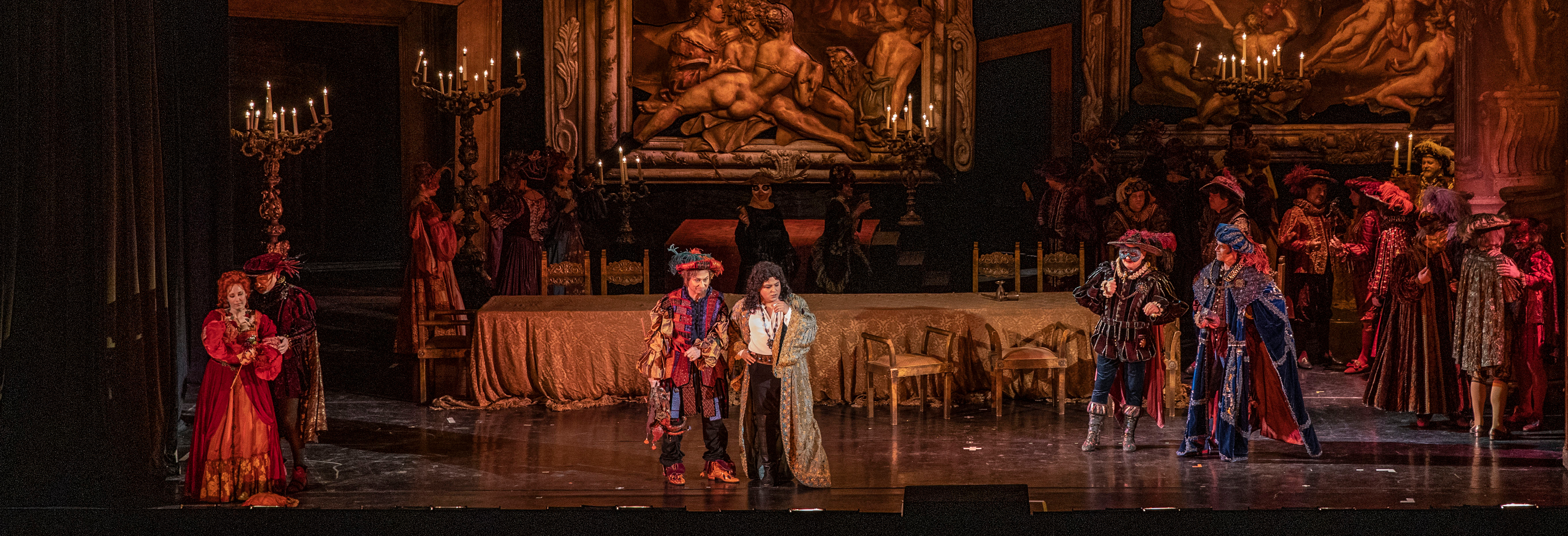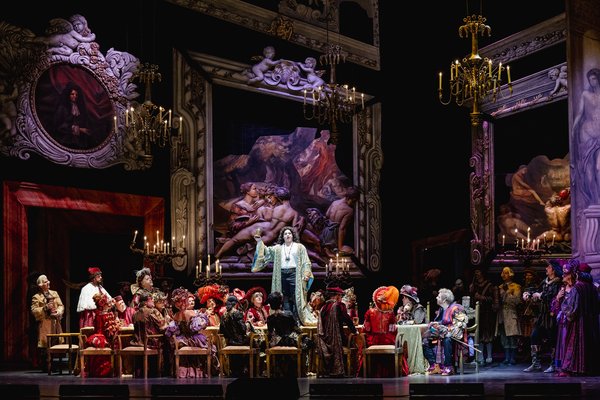
RIGOLETTO
9 July 2024, 6:30 p.m.
In Brief
Opera in three acts, in Italian, with Hungarian, English, and Italian subtitles
The lecherous noblemen of the Mantuan court must be entertained, and a deformed jester spares no one his jeers to ensure that they are. And yet he prays that the scathing mockery he heaps on the suffering of others will not return to haunt him. All he must do is seal his work off from his family life. But when his daughter, following her own heart, leaves the safety of those walls, Rigoletto's secret double life leads her to her doom.The popularity of Verdi's work is no accident: with Shakespearean profundity and thrilling music, it depicts a tragedy of acceptance and schadenfreude, love and self-sacrifice.
Details
- Location
- Hungarian State Opera
- Date
- July 9, 2024
- Start time
- 6:30 p.m.
- End time
- 9:45 p.m.
Synopsis
Act 1
First scene
A hall in the ducal palace
The Duke of Mantua is boasting about his most recent adventure to the assembled nobles: he has made the acquaintance of a young well-to-do maiden of the city, whom he has approached dressed in the simple clothes of a student with the intention of seducing her. In the meantime, he is also not giving up his courtship of the wife of the Count of Ceprano: in spite of her husband's presence, he makes advances at her.
Rigoletto, the court fool, arrives and mocks the married couple, who are at the mercy of the duke's whims. Nearly all of the courtiers have fallen victim to the jester's sharp tongue at one time or another, and when Marullo arrives with the news that Rigoletto is keeping a lover, they all resolve to repay him for his many humiliations by abducting the girl. The Count of Monterone storms into the ball to call the duke to account for seducing his daughter, only to be caricatured by Rigoletto. Monterone curses the jester.
Second scene
Rigoletto's house and garden and the adjacent street
Rigoletto is terrified by Monterone's curse. On his way home, he is stopped by the assassin Sparafucile, who offers the jester his services. Rigoletto dismisses him and hurries home to his daughter, Gilda, whom he has raised sequestered away from the world in complete ignorance of her father’s name and profession. The girl, however, is concealing from him the fact that for months now she has been meeting with an unknown student, with whom she has fallen in love. The student is none other than the duke in disguise. After Rigoletto departs, the courtiers arrive with the aim of abducting the woman whom they believe to be the jester's lover. Rigoletto suddenly returns, and they convince him that they are trying to kidnap Countess Ceprano. Rigoletto takes part in the game, and only when it is too late does he realise that he has assisted in the abduction of his own daughter.
Act 2
A hall in the ducal palace
The courtiers offer up the kidnapped girl to the duke. Also arriving, overcome with despair, is Rigoletto: this time, however, he is the one who is mocked by the courtiers. The jester informs his daughter of her mysterious suitor's identity and true nature nature, but Gilda remains unmoved: she loves the duke. Rigoletto swears deadly revenge.
Act 3
By the River Mincio and Sparafucile's house
During the night, Rigoletto finds Sparafucile and hires him to murder the duke, but first he wants to disillusion Gilda with him. He forces her to watch as the duke courts Sparafucile's lovely younger sister, Maddalena. The confused and distraught Gilda is ordered by her father to put on men's clothing and head for Verona right away. The girl, nevertheless, returns to Sparafucile's house, where she finds out about her father's murderous plan. Fancying the prince, Maddalena asks her brother to spare his life and instead kill the first stranger who enters the inn. Gilda decides to sacrifice herself. Wearing men's clothes, she knocks on the gate and, upon entering, is mortally wounded. Sparafucile hands over a sack to Rigoletto, claiming that it contains the duke's dead body. Upon hearing the duke's voice in the distance, however, Rigoletto opens the sack and discovers his dying daughter inside it. Monterone's curse has thus been fulfilled.
Gallery
Reviews
“I continue to feel that scenographic ideas like (…) Attila Csikós’s stylised interior of the grand hall in the opening scene of Rigoletto are acceptable even today.” (Péter Bozó, Muzsika)
